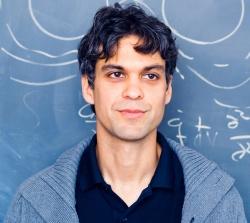Directory

- Pronouns he, him, his, his, himself
- Title
- Professor
- Division Physical & Biological Sciences Division
- Department
- Astronomy & Astrophysics Department
- Phone 831-459-3400
- Website
- Office Location
- Interdisciplinary Sciences Building, 341
- Mail Stop UCO / Lick Observatory
- Faculty Areas of Expertise Astronomy, Astrophysics
Summary of Expertise
Professor Ramirez-Ruiz is eager to understand our origins and disruptive events in the night sky. He works with computer models to understand the cataclysmic death of stars and recently led efforts to uncover the origin of the heaviest elements in the universe. Ramirez-Ruiz tests out his theories with complex computer simulations that defy the boundaries of human experience and the assumptions we make about the universe.Research Interests
Professor Ramirez-Ruiz research focuses on the violent universe with an emphasis on stellar explosions, transient astrophysics, gravitational wave sources and accretion phenomena. He is particularly interested in understanding the physical processes that govern accretion onto relativistic objects such as black holes and neutron stars.
Biography, Education and Training
Ramirez-Ruiz was born in Mexico, studied physics at the Universidad Nacional Autónoma de México, and pursued his PhD at Cambridge University. He was the John Bahcall Fellow at the Institute for Advanced Study at Princeton before joining the faculty at UCSC, where he is a professor of astrophysics and astronomy and holds the Vera Rubin Presidential Chair.Honors, Awards and Grants
Since joining the UCSC faculty in 2007, Ramirez-Ruiz has won a number of awards for his research, including a Packard Fellowship, the NSF CAREER Award, the Radcliffe Fellowship at Harvard, the Niels Bohr Professorship from the Danish National Research Foundation, the Presidential Award for Excellence in Science Mathematics and Engineering Mentoring, the HEAD Mid-Career Prize from the AAS and the Bouchet Award and the Dwight Nicholson Medal from the American Physical Society. He is a fellow of the American Physical Society and member of the Mexican Academy of Sciences and the American Academy of Arts and Sciences.
